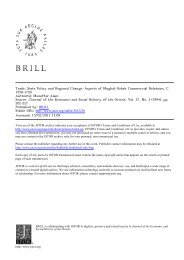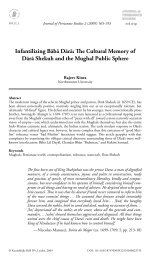The Mughals, the Sufi Shaikhs and the Formation of the Akbari ...
The Mughals, the Sufi Shaikhs and the Formation of the Akbari ...
The Mughals, the Sufi Shaikhs and the Formation of the Akbari ...
You also want an ePaper? Increase the reach of your titles
YUMPU automatically turns print PDFs into web optimized ePapers that Google loves.
FORMATION OF THE AKBARI DISPENSATION 151<br />
feast that Babur gave in Agra on December 18, 1528. On this occasion,<br />
<strong>the</strong>y sat at his right <strong>and</strong> received rich presents. 44 However, <strong>the</strong>y did not<br />
choose to stay in India. On <strong>the</strong> o<strong>the</strong>r h<strong>and</strong>, Khwaja Khaw<strong>and</strong> Mahmud<br />
set out for India only in <strong>the</strong> spring <strong>of</strong> 1530, but before his arrival, Mirza<br />
Haidar Dughlat writes, Babur had died. He was never<strong>the</strong>less received<br />
in Agra with great honour by <strong>the</strong> new ruler, Humayun. 45 Soon however,<br />
‘for some [unspecified] reasons’, he left for Kabul <strong>and</strong> died <strong>the</strong>re. 46<br />
In Dughlat’s account, <strong>the</strong>re is a vague clue suggesting <strong>the</strong> reason why<br />
he did not stay at Humayun’s court. Khwaja Khaw<strong>and</strong> had apparently<br />
come with <strong>the</strong> intention <strong>of</strong> occupying <strong>the</strong> exclusive position <strong>of</strong> <strong>the</strong> royal<br />
spiritual master. But while Humayun welcomed <strong>and</strong> showed respect<br />
to him, he was also simultaneously devoted to a Shattari <strong>Sufi</strong> saint,<br />
Shaikh Phul. Dughlat writes:<br />
At that period <strong>the</strong>re had arisen in Hindustan a man named Shaikh Phul.<br />
Humayun was anxious to become his disciple, for he had a great passion for<br />
<strong>the</strong> occult sciences—for magic <strong>and</strong> conjuration. Shaikh Phul having assumed<br />
<strong>the</strong> garb <strong>of</strong> a Shaikh, came to <strong>the</strong> Emperor <strong>and</strong> taught him that incantation<br />
<strong>and</strong> sorcery were <strong>the</strong> surest means to <strong>the</strong> true attainment <strong>of</strong> an object. Since<br />
doctrines such as <strong>the</strong>se suited his disposition, he became at once <strong>the</strong> Shaikh’s<br />
disciple. Besides this person <strong>the</strong>re was Maulana Muhammad Parghari who,<br />
though a Mulla, was a very [irreligious] <strong>and</strong> unprincipled man, <strong>and</strong> who<br />
always worked hard to gain his ends, even when <strong>the</strong>y were <strong>of</strong> an evil nature.<br />
<strong>The</strong> Shaikh asked <strong>the</strong> aid <strong>of</strong> Mulla Muhammad <strong>and</strong>, in common, by means <strong>of</strong><br />
flattery, <strong>the</strong>y wrought upon <strong>the</strong> Emperor for <strong>the</strong>ir own purposes, <strong>and</strong> gained<br />
his favour.<br />
Not long after, I went to visit <strong>the</strong> Emperor (...), but I could never ga<strong>the</strong>r<br />
that he had learned anything from his pir, Shaikh Phul, except magic <strong>and</strong><br />
incantation. But God knows <strong>the</strong> best. <strong>The</strong> influence <strong>of</strong> Shaikh Phul thus<br />
confirmed, Maulana Muhammad, or ra<strong>the</strong>r <strong>the</strong> Emperor <strong>and</strong> all his following,<br />
neglected <strong>and</strong> slighted Khwaja Nura, who had a hereditary claim to <strong>the</strong>ir<br />
veneration. This naturally caused <strong>the</strong> Khwaja great inward vexation. 47<br />
44 Baburnama, trans.Beveridge,pp.632 <strong>and</strong> 641–42, Thackston trans., pp. 426<br />
<strong>and</strong> 432; Dale,<strong>The</strong> Garden <strong>of</strong> <strong>the</strong> Eight Paradises, pp. 427–28. Dale also mentions one<br />
unidentified Khwaja Chishti.<br />
45 A History <strong>of</strong> <strong>the</strong> Moghuls <strong>of</strong> Central Asia, p.398; Akbarnama, Vol.II,p.194, English<br />
trans., p. 301.<br />
46 A History <strong>of</strong> <strong>the</strong> Moghuls <strong>of</strong> Central Asia,p.398; Samsam al-Daula Shahnawaz Khan,<br />
Ma’asir al-Umara, Vol. II (Calcutta: Biblio<strong>the</strong>ca Indica, 1891), p. 575.<br />
47 A History <strong>of</strong> <strong>the</strong> Moghuls <strong>of</strong> Central Asia, pp. 398–99. See also Persian text edited<br />
by Wheeler M. Thackston, (Cambridge, MA: Harvard University Press, 1996),<br />
pp. 345–47.<br />
http://journals.cambridge.org Downloaded: 15 Feb 2011 IP address: 129.174.97.34






